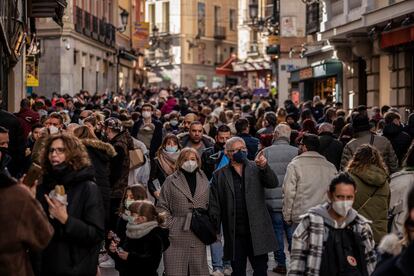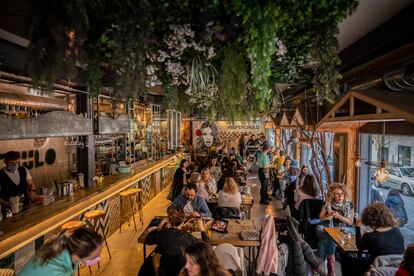Experts call for caution at Christmas after Málaga coronavirus outbreak
Epidemiologists warn that celebrations during the festive season could turn into superspreader events after at least 68 health workers tested positive for the virus following a work lunch

A Christmas lunch, an outbreak, and at least 68 people infected. The propagation of the coronavirus at a celebration held by staff from the Hospital Regional in Málaga, which was attended by 173 professionals from the intensive care unit (ICU) team, is a good example of the risks that lie ahead over the coming weeks in Spain: superspreader events that push up the curve of infections, albeit not necessarily causing immediate hospitalizations – according to healthcare sources, all of those infected in Málaga have mild symptoms or are asymptomatic – but triggering quarantines, reorganization at work and more pressure on primary healthcare and other public health services.
The outbreak in Málaga is, for epidemiologists, a timely reminder of what the health authorities have been repeating: SARS-CoV-2 is still circulating widely in Spain and if restrictions aimed at curbing the spread of the virus are relaxed during a period of increased social contact – the December national holidays (December 6 and 8), work dinners, the Christmas holiday season, etc. – there will be consequences.
Clara Prats, a researcher in Computational Biology at the Catalonia Polytechnic University (UPC), sums up the situation: “The growth [in cases] will continue for at least the next two weeks. Beyond that, it’s difficult to make predictions. Independently of whether we reach a peak at Christmas, a week before or after, over these dates we will have quite high levels of transmission. As such, the likelihood that at any meeting, whether it’s for work or with family, that there is an infected person there is not negligible. As such, we have to behave accordingly: not hold large meetings, limit them to close contacts, and be careful with ventilation.”
For now, Spain’s central Health Ministry has no plans to impose drastic measures and is hoping that the situation will be brought under control with the measures that the regions – which are in charge of their own restrictions, healthcare systems and vaccination programs – already have within their reach. The central health authorities have so far ignored a document from the Health Ministry’s Coordination Center for Health Alerts (CCAES) that on November 30 recommended “establishing limits for the number of participants at public and social events, especially during Christmas celebrations.”
Last week, Health Minister Carolina Darias called on people to get vaccinated and to maintain protection measures, such as the use of masks. The minister insisted that face coverings should be used outdoors when social distancing is not possible, given that at this time of year large crowds on the streets are common – especially during public holidays such as the two this week.

High community transmission of the coronavirus affects many aspects of life, explains Fernando Rodríguez Artalejo, a professor of public health at Madrid’s Autonomous University. “As such, we need to keep vaccinating the unvaccinated, accelerate the administration of booster shots and roll these out to the under-60s, start [vaccinating] children as soon as possible to protect them, reduce transmission and ramp up non-pharmacological measures,” he explains, the latter a reference to social distancing, masks, limited capacity in venues and ventilation.
The consequences of this sixth wave of the pandemic in Spain will depend on how much the virus spreads. In a population where the vast majority of people are vaccinated, the risk of a generalized overload of hospitals is unlikely. With a cumulative incidence in Spain of 248 cases per 100,000 inhabitants over the previous 14 days – and rising – the situation in the majority of the country’s regions is one of low risk. Seven territories, however, have reached medium risk according to the Health Ministry’s new traffic light system, which has been adapted to better reflect the situation now that so many citizens are fully vaccinated. The consequences, however, will be very different should the cumulative incidence reach as high as 1,000 or 2,000 – and this will depend, in a large part, on the behavior of the public.
Things are going badly and if we don’t do what’s necessary they will get worseAlberto Infante, teacher at the National School of Health
Alberto Infante, a teacher at the National School of Health, is very pessimistic. “Things are going badly and if we don’t do what’s necessary they will get worse,” he explains. “Christmas will be very grim and January black. In Guipúzcoa [a province in the northern Basque Country region, which has a cumulative incidence of 954 cases per 100,000 inhabitants], which has infection levels similar to the Netherlands, they are already transferring Covid patients to hospitals in Bizkaia and Álava and postponing non-urgent surgeries.”
Internationally, there are other examples of interest. Denmark, for example, is currently suffering its biggest wave of positive cases since the pandemic began. According to the Our World in Data website, the country’s cumulative incidence per 100,000 inhabitants over 14 days has exceeded 1,000 cases. But with 76.7% of the population vaccinated, it has under half the number of Covid-19 patients in hospitals as it did last winter, when the cumulative incidence was below 800.
Even in a much less serious situation than a year ago, a spike in the infection curve could still increase the pressure on hospitals, as has happened in Belgium. There, the cumulative incidence is above 2,100 per 100,000 inhabitants over 14 days. Despite 74.8% of the population being fully vaccinated, the healthcare system is not in as serious a condition as it was during the worst moments of the pandemic, but it is of great concern for the authorities.
While it is very difficult to make precise comparisons between countries, given that there are many differences between them beyond just vaccination data, the situation can serve as a framework for Spain to take references from. With 80% of the Spanish population vaccinated, experts consulted by EL PAÍS insist that caution is needed during this December long weekend and indeed all of the upcoming Christmas celebrations. The vaccines have softened the dangers of Covid-19, but the more cases there are, the more probabilities of serious consequences for health – in particular, for the most vulnerable members of society.
Tu suscripción se está usando en otro dispositivo
¿Quieres añadir otro usuario a tu suscripción?
Si continúas leyendo en este dispositivo, no se podrá leer en el otro.
FlechaTu suscripción se está usando en otro dispositivo y solo puedes acceder a EL PAÍS desde un dispositivo a la vez.
Si quieres compartir tu cuenta, cambia tu suscripción a la modalidad Premium, así podrás añadir otro usuario. Cada uno accederá con su propia cuenta de email, lo que os permitirá personalizar vuestra experiencia en EL PAÍS.
¿Tienes una suscripción de empresa? Accede aquí para contratar más cuentas.
En el caso de no saber quién está usando tu cuenta, te recomendamos cambiar tu contraseña aquí.
Si decides continuar compartiendo tu cuenta, este mensaje se mostrará en tu dispositivo y en el de la otra persona que está usando tu cuenta de forma indefinida, afectando a tu experiencia de lectura. Puedes consultar aquí los términos y condiciones de la suscripción digital.









































